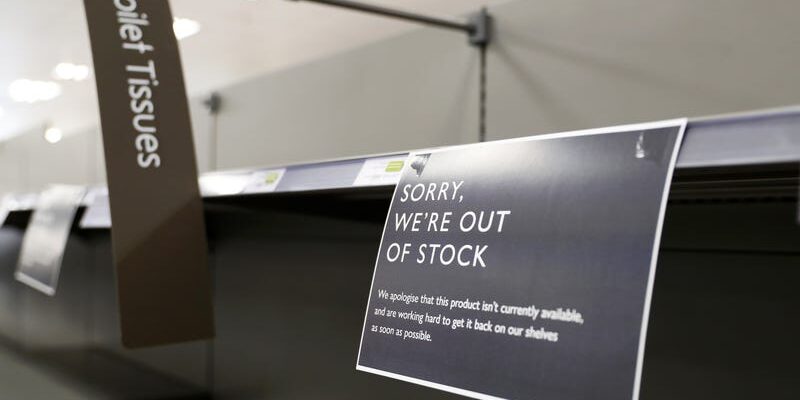I have worked in global supply chains for the better part of two decades, largely in a government contracting role – building and supplying sustainable logistics infrastructure platforms in conflict zones and frontier markets (i.e., economies generally considered at the bottom of the “Third World”). My primary focus were areas designated a strategic priority in the “Global War on Terror” (GWoT). This meant principally Afghanistan, Iraq, Pakistan, and various areas of the Middle East and North Africa (MENA), with a healthy dose of Sub-Saharan Africa and Central Asia in the mix. Consequently, between my practical experiences – creating local companies from scratch, establishing local bank accounts, building threat assessments, constructing warehouses, negotiating with foreign truckers, obtaining legal authorities to import/export, finding/vetting suppliers, etc. – and my MBA, I have a pretty good handle on trends in global supply chains. My advice: start stocking up on toilet paper now.
Today, I co-own a logistics company that focuses on American domestic distribution. The mess that is the American supply chain environment has multiple contributing factors. The myriad of influencers has no single cause. Seamless supply chains are rare in history and the United States enjoyed a relatively tranquil global supply system for the better part of the past four decades. Unfortunately for the American consumer, that is about to change. Here are just a few major contributors to the collapsing global supply chain that will have a brutal impact on the United States.
Sorry, but this is about to get wonky.
1. Currency Markets are in Disarray: this is one of the most overlooked factors of global supply chains, but it is an important one. Global currency markets impact purchasing of fuel, berthing, taxation, final mile distribution – nearly every facet of the supply chain is dependent on a currency driven action. Thus, the U.S. Government is currently making matters far worse with its failed embrace of inflation.
There are clear indications that the current U.S. Government prefers inflation. Economic theorists have long believed that inflationary environments lead to better job markets. But, there are three problems with the Biden Administration’s embrace of inflation.
First, the Biden Administration presumes that the U.S. Dollar can be manipulated into an inflation driven currency devaluation. Part of this is a desperate attempt to monetize the growing, unsustainable American debt. Congress is spending money because it believes it can reduce the value of that debt by simply making the U.S. Dollar worth less (not “worthless” – although it will eventually get there at this rate). What the Democratic Party and many in the Establishment Right fail to recognize is that, currently, there is no global competitor to the U.S. Dollar. All of the Quantitative Easing (i.e., printing more money) cannot reduce the value of a given currency (helping long-term debtors) if there are no other Government backed currencies into which investors can safely flee. At present, the U.S. Dollar, the Swiss Franc, and the Yen seem to be the most stable currencies, which is shocking, given how politically unstable the United States is at the moment. But given the totality of the global landscape, Pound Sterling and the Euro look tragically worse, in the long term. Since the Chinese do not yet offer a global currency, the three most stable currencies are effectively strengthening amongst each other, with the U.S. Dollar making a recovery year-over-year compared to the Yen. It is strengthening, which is both a blessing and a curse.
Second, the job market collapse was not disrupted by an economic event; it was disrupted by a global (I believe, manufactured) pandemic. Economic policies introduced to address the pandemic’s impact have complicated the job markets, largely due to continued restrictions in predominantly Democrat-run states and increased unemployment and/or social welfare benefits. The impetus to work when unemployment pays more than many jobs has suppressed worker participation at the same time that full employment is unlikely in states within which normal activity is still constricted. The Biden economic team cannot fix this issue with greater levels of inflation. This would be akin to applying burn ointment to a broken arm – it is addressing the wrong problem with the wrong solution.
Third, the Biden team’s embrace of inflation as a job producer runs into the reality that inflation is happening in areas that serve to harm the overall economy – namely fuel costs – but not in the way that is typical. Since oil is a Dollar denominated commodity, it typically has an inverse relationship with the Dollar. In other words, as the Dollar strengthens, oil falls in relative price. However, the Biden Administration’s bizarre decision to end American oil independence, created a supply challenge, negating any gain for the American fuel consumer. Of course, trucks, planes, and ships rely on fuel. Thus, when the price of fuel rises, it has an immediate impact on global supply chain pricing and operating costs.
Many global operations rely on forecasts to establish supply chain budgets in the preceding year. Whereas it was a fairly safe assumption that Biden would ascend to the presidency, few could have predicted how badly he would disrupt both the currency and the fuel markets. Since the global borrowing currency of choice is the Yen and the global purchasing currency is the U.S. Dollar, with the Swiss Franc in reserve (required in most of the former Soviet Union), the fact that the U.S. Dollar and oil are rising simultaneously, relative to the Yen, is having a material impact on global shipping companies – especially those operating out of East Asia. The result of such confusion is a situation by which ocean carriers need to balance capacity with anticipated rising fuel costs in a heretofore uncharted global currencies territory. If you are an ocean carrier, you run the risk of not being able to adequately fill your ship to maximize its capacity in a given direction, while fuel prices rise uncontrollably in transit, and currency markets remain somewhat unpredictable. The result is that ocean carriers not only have to charge a premium for space to accommodate currency risks, but in some cases, it is cheaper to withhold a vessel rather than to put it in operation in such an uncertain environment. If you rely on imported production, you may find yourself in a situation whereby shipping “space” is harder and harder to find – raising prices and devastating budgeted forecasts for 2021 and 2022.
2. Ports Are Closed/Closing: The global production markets were severely disrupted by Covid-19 for a number of reasons. First, manufacturers of typical products either suddenly found those items irrelevant (causing supply overages) or in over-demand (causing supply shortages). It takes manufacturers months – sometimes years – to realign production to accommodate changes in manufactured goods and customer needs. Compounding the issue of realignment of either production and/or product, is the availability of raw materials. Consequently, if you are a toilet paper manufacturer, for instance, you need soft wood pulp to produce the product. But if (a) other manufacturers are consuming soft wood pulp for other purposes, (b) the usual suppliers/transporters of soft wood pulp are not working at full capacity, (c) your ordering is abnormal relative to usual need, or (d) a combination of these three issues, you will find it hard to produce toilet paper – especially if other toilet paper producers are competing in the same limited raw materials space. Considering that this is just one product, imagine the totality of the supply chain disruption driven by medical mask manufacturers, surgical latex gloves, hospital gowns, and other Personal Protective Equipment (PPE) driven by Covid concerns.
Whereas I am of the opinion that the Covid-19 “pandemic” is entirely hyped for political reasons, it does not negate the very real challenges of Covid on global supply chains. But here is where the real issue of production realignment had the greatest impact: global transportation. Manufactured products, especially out of China, were pulled back as distributors sought to realign their own commercial needs, attempting to quickly understand the new consumer markets. Unable to anticipate when markets would reopen while simultaneously trying to gauge a “new normal” (e.g., working from home; less “going out” = less need for business attire), the pullback from ordering caused a backlog of deliveries. When distributors, especially big box wholesale and retail chains, turned the green light back on, a flood of shipments came racing to the United States and elsewhere, as East Asian producers quickly sought to get orders on their books. The flood was too much for the dilapidated American supply chain infrastructure to handle – especially at the inland ports.
The result was that sea containers flooded Midwestern inland ports (primarily rail terminals), from which most of the East Asian produced goods are broken down into more manageable shipments and distributed to the rest of the country. However, with workers unavailable (due to generous leftist social welfare benefits) and the remaining employees overwhelmed, Midwest terminals chose to shut down in July and August to handle the logjam of accumulated sea containers. At the time of this writing, many are still shut down and working through the backlog. Simultaneously, West Coast ports, which operate at varying levels of efficiency, are awaiting the green light from inland terminals, keeping ships off the coast for weeks and even months at a time. The result has been a near product shutdown for those states dependent on West Coast imports and Midwestern inland port terminals. For the United States, that is nearly everybody.
The end result of the supply chain sling shot of product, which largely began in January, is that we (Americans) lack the capacity to receive and redistribute freight, causing a global shortage of sea containers, and creating a freight “traffic jam” at various ports, causing them to shut down at exactly the same time that ocean vessel operators are rebalancing the availability of boats and space.
3. Regulatory Pressures: The final issue that I am addressing in this piece, before you fall asleep, are regulatory issues that are adding additional complexity to global markets. One outstanding issue are tariffs on Chinese manufactured goods, originally imposed by President Trump, but maintained under President Biden. Personally, I agree with the tariffs. The neoconservative argument has been that consumers are the ones who bear the brunt of tariffs, but that is not necessarily true. Manufacturers can choose to return to the United States, boosting American employment and earnings. However, that is unlikely because of our unfavorable tax and regulatory environment, especially under a Democrat President. The other option is to transition to alternative and more diverse production sources from countries with more equitable American trade relations, such as Malaysia, Vietnam, or Taiwan. Apparently, manufacturers opted for the latter and this has hurt China’s overall production output (as reported by The Wall Street Journal). In effect, Trump was right, and the neocons were wrong – manufacturers shifted to zero-or-low tariff countries, harming China, not consumers. Unfortunately, as previously described, shifting production output takes time, especially for imported items that are regulated by other government agencies besides Customs and Border Protection (CBP), which requires additional regulatory hurdles.
Added to this complexity are World Trade Organization (WTO) disputes that create uncertainty in manufacturing. The United States has been engaged in an astounding three-hundred-plus WTO trade disputes over the past two decades, of which, more than half are complaints against the United States. This creates domestic regulatory uncertainty, which has a paralytic impact on major producers and sourcing. Two key WTO complaints that are impacting American supply chains are an Anti-Tariff complaint levied by China against the United States (which remains dormant at the moment as the Biden Administration drags its feet) and a dispute between South Korea and Japan impacting the availability of additional vessels from East Asia. Both disputes disrupt sourcing (China) and transportation (South Korea vs Japan) at a time when so many other factors are causing bottlenecks from East Asia.
Supply chains are systemic, interconnected, and complex. Geopolitical uncertainty, regulatory hurdles, bureaucratic inertia, raw materials disruptions, weather… all of these factors play a role in the linear process from product design to consumption. The three factors I covered complicating global supply chains are merely a drop in the bucket regarding the myriad of challenges and head winds that global supply chains face. However, they are important because they can be fixed with more coherent and informed policy making. Unlike weather disruptions or a terror attack, stupid policies can be stopped.
Unfortunately, the United States is addicted to stupid policies. Lobbyists and lawyers pull greedy, ill-informed policy makers into positions that harm the American citizen. Had it not been for politicians beholden to Communist Chinese lobbyists, the United States would not be nearly as dependent on China for its own consumer goods. Had it not been for leftist political leaders in Midwestern states, workers would be more readily available to handle the influx of goods that poured into the American economy. Had it not been for current monetary policy, embracing a weak dollar to cheapen the debt, the multitude of currency related issues would not be the challenge they have become. All of these are policy problems.
So, what is the solution? Secede – not just politically, but in mind, body, and spirit. Become more self-sufficient. Become less addicted and dependent on foreign-made goods. The globalists powers that are incapable of achieving their globalist agenda because they do not understand the very mechanisms of the global supply chains can only remain relevant as long as you let them remain relevant. Walk away and build upon our own. But until that happens, buy more toilet paper – supply problems are coming back quickly.
The son of a recent Irish immigrant and another with roots to Virginia since 1670. I love both my Irish and Southern Nations with a passion. Florida will always be my country. Dissident support here: Padraig Martin is Dixie on the Rocks (buymeacoffee.com)






Mr Martin, if you don’t already have the book ‘Economics In One Lesson’ by Henry Hazlitt, get it. Back to your essay: I, too, work in logistics for a wholesaler of building materials. About a year ago, there was a shortage of OTR truck drivers to the tune of about 35,000. That shortage has not been reduced. Any readers of ID not currently living in the woods, had better get there quickly. Be prepared to eat a lot of venison, squirrel, and rabbit meat. If you can get close to a river, to catch catfish and bass, that would be a plus. And if you don’t already have one, get a wood-burning stove to heat your house and to cook on. As far as tail-wiping paper goes, you might have to improvise. If you can get to a place with abundant hardwood, you’re set. Might be a little challenging when it’s raining and 29 degrees, but you’ll make it. After all, did our ancestors have toilet paper in the horse and buggy days?
No, but they had each other and did not allow anyone that wanted to move in with sprinkle magic dirt on themselves and then claim to be you and lay claim to everything you built and own. I lived down the road from a paper mill and it made no difference in the amount of toilet paper or anything else we had, they might as well have been on the moon, its not our paper mill just because it’s here. Also, becoming a primitive hunter gatherer is not victory, we need to start planning for victory.
Thank you for the tip, Rebel Forever. I will certainly check it out.
I fully agree that we need to get back to self-sufficient and reliable proteins – such as rabbot and fresh water fish variants. The days of going to Costco for flash frozen Alaska Cod or massive sides of beef are shortly coming to an end.
God Bless,
Padraig Martin
Go bug out man…people have been saying this for decades.
Anecdotal to be sure but I am already seeing intermittent but more frequent out of stock notices at places like Sam’s Club for items like toilet paper and paper towels.
I believe this is a sign of even more challenges coming down the pike, Mr. Sido.
Thank you for reading!
God Bless,
Padraig Martin
We need our own supply chain where we depend on nobody but each other for everything we need. We need to work on that right now. We need to work on everything and I don’t see that happening. We still do not educate our kids, everything we have learned about Jews, the invasion and occupation of the South, how the occupational government works, fake news, you name it, just in our lifetime alone has never been written down and made teachable in the form of a curriculum. So the arduous and slip shod process of red pilling is as close as we get and that is not nearly enough, not even close.
Kids should not only be learning their real history written and passed down to them by us, but also how supply chains work, how everything works and more importantly how it SHOULD work, all with the singular purpose of reclaiming our home. Yet here we are in the year 2021 worrying about toliet paper.
We have to do better.
Hello Michael,
As always, I greatly appreciate your feedback. You are correct, we should be getting tribal and we need to build sustainable networks of likeminded people. All that said, there are many of us that are out there, doing just that. It is happening – just hard to advertise in an environment in which the federal government will hunt down even the slightest sniff of Southern solidarity. But it is happening.
God Bless,
Padraig Martin
This is happening again.
Already, computer chips that are needed for many things, including logistics, are not available. Cannibalizing equipment to keep other equipment running is standard procedure at many logistics companies. Freight companies are pulling less than full loads. Big companies are gobbling up freight available in anticipation.
Refrigeration break downs are lasting longer,which is debilitating
to grocery stores. Two major grocery stores in my area have lost refrigeration in the last two weeks.
Find local supplies of what you need, stock up on things that are going to be less available.
Thanks for opening the eyes of those not familiar with how items get to their homes.
We should be thinking in terms of survival as a people and not an individual level. Nobody will make it on their own.
I assure you, we are networking.
Thank you, Father Dabney. The global supply chain is breaking down rapidly and of all the people I know, I knew you would recognize this trend before anyone else. When energy supply chains collapse – which appears to be next – that will be the end of the world as we have known it for the past one hundred years.
God Bless,
Padraig Martin
Well written article. Good explanation of the shipping backlog situation.
Thank you for the compliment, Johnny Redux, and thank you for reading the article.
God Bless,
Padraig Martin